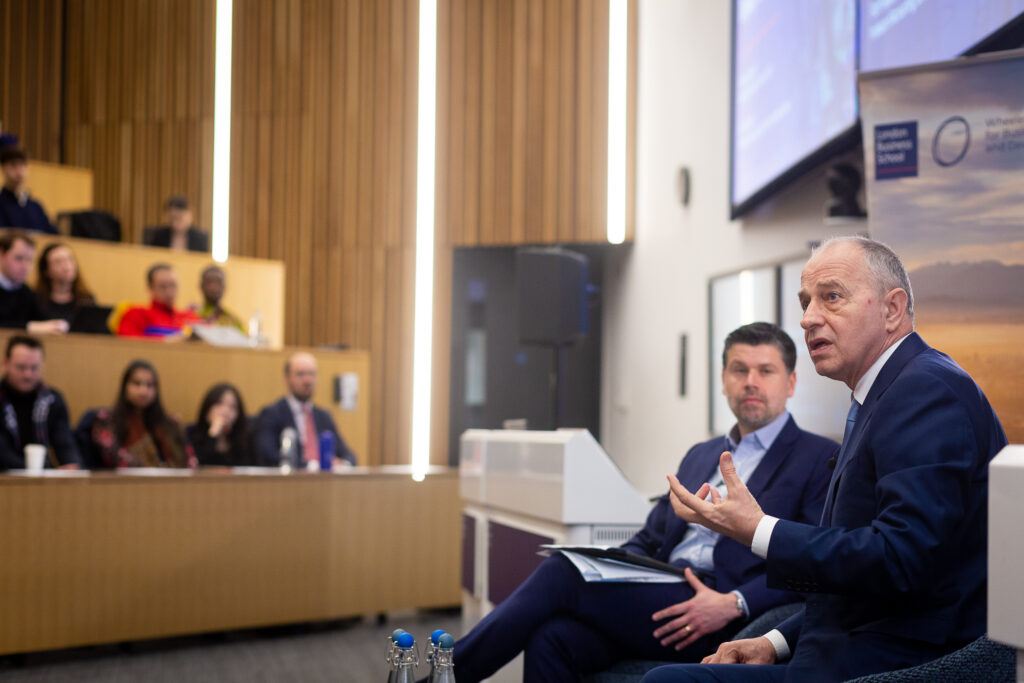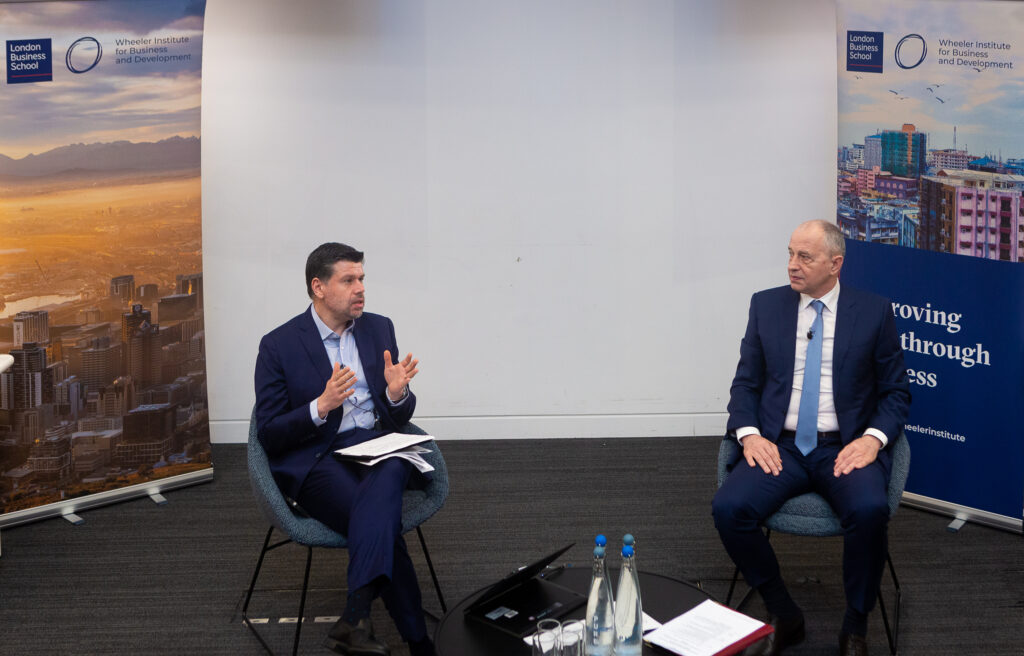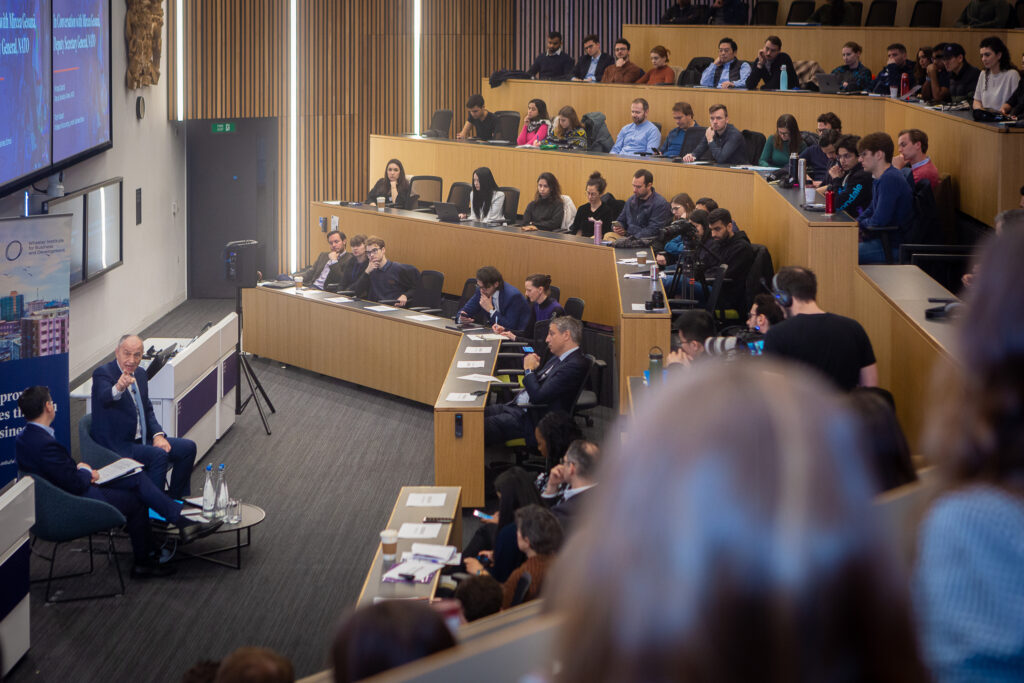The Wheeler Institute for Business and Development was delighted to welcome Mircea Geoană, Deputy Secretary General of NATO, who spoke with Florin Vasvari, Professor of Accounting at London Business School, about the key lessons learnt from the conflict, the significant challenges and opportunities ahead, the need for united international resilience and the global strategic shifts in the context of the war and beyond.
Armed conflict brings with it tragic and untold losses and can lead to cascading social and economic effects not only for the nations involved but countries around the world. NATO Deputy Secretary General Mircea Geoană visited London Business School’s Wheeler Institute to join Professor Florin Vasvari in a discussion on the Russian-Ukrainian conflict, the lessons NATO has learned from this period, and how the organization is innovating to ensure a secure future for its member nations around the world.
The event began with Professor Elias Papaioannou welcoming those who packed into the amphitheater and the nearly 1,000 others who joined via Zoom. He spoke about the mandate of the Wheeler Institute to sponsor and promote research on first-order development issues around the world. He also thanked Tony and Maureen Wheeler for their continued support in making events like this one possible, before handing it over to Professor Vasvari to introduce Deputy Secretary General Geoană.
Mr. Geoană’s long and illustrious career began in Romania’s Foreign Ministry. He eventually served as Romania’s ambassador to the United States before returning to Romania to become the country’s Foreign Affairs Minister. He was elected as Senator to the Parliament of Romania Senate in 2004, eventually serving as the Senate’s President from 2008 to 2011. After his time in Romanian politics, in 2019, Mr. Geoană became the first Eastern European to join NATO as its Deputy Secretary General. As part of his responsibilities, he also serves as Chair of the NATO Innovation Board.
Perspectives on the Russia-Ukraine Conflict
The conversation began by discussing the conflict in Ukraine and whether it was preventable. Mr. Geoană said NATO worked tirelessly right up until the final hours but was unable to persuade President Putin to not invade Ukraine, stating that this act of aggression was not driven by what the President claimed is the existential threat of a NATO expansion, but by expansionist tendencies that are reminiscent of Russia’s past. Contrary to what is purported by the Russian leader, NATO, he insists, does not have an aggressive stance against Russia and that the notion NATO’s growing list of members is the organization attempting to “encircle” the country is baseless. He emphasized the defensive and political alliance is focused only on keeping peace and maintaining stability for the more than 1 billion people that reside in its member nations.

The Deputy Secretary General did not downplay the global implications that will come with the outcome of the conflict, however. The result of the conflict will determine if brute force can replace the rule of law. He emphasized the conflict serves as a litmus test for independence, sovereignty, and the UN Charter, with consequences that could shape the world for decades to come, making it all the more important for Ukraine to be supported in this.
While he believes Russia’s objectives in the Ukraine conflict have not changed strategically – to prevent Ukraine from joining the West and keeping it within its sphere of influence – Mr. Geoană explained that Russia severely miscalculated Ukraine’s capacity to resist as well as the West’s capacity to support. He remarked on the bravery and ingenuity of Ukrainian people, citing examples of a Ukrainian teenager using a commercial drone to relay information about Russian tank movements and a ballerina who swapped her dancing shoes for body armor to fight on the frontlines.
On the timeline for the conflict coming to a close, Mr. Geoană admitted that the chances for a peaceful resolution in the near future are slim but stressed the importance of staying the course and remaining resilient in supporting Ukraine. In the meantime – and in a form fitting for a business school – the Deputy Secretary General explained that Russia’s cost-benefit analysis for invading Ukraine continues to rapidly deteriorate.
NATO’s Open Door Policy and A Country’s Right to Choose
With the recent news of Turkey ratifying Finland’s membership to NATO, the discussion turned to NATO’s growing list of members. Mr. Geoană emphasized that being in the geopolitical “gray zone” is a particularly dangerous position for countries to be in during times of conflict and that NATO’s open-door policy means allowing a nation to join that chooses to.
The Deputy Secretary General acknowledged the risk of conflict spreading to countries like Moldova. Moldova’s position between Ukraine and Romania, along with its small size, relatively limited military, along with the pro-Russian forces at play internally, he says present significant challenges for the nation. He added that if countries like Ukraine, Moldova, or others choose to align themselves with NATO and the European Union, and are deemed ready, they should be welcomed. While the ultimate decision lies with the countries themselves – adding no country should hold power over another’s decision to join NATO or the EU – there is a possibility for Ukraine and others to engage more closely with Europe and NATO in the future.
Continued Efforts to Innovate
Throughout the discussion, the Deputy Secretary General spoke about how NATO continues to learn and evolve as an organization to meet the growing challenges of global security. In this context, he emphasized the importance that the organization continues to seek out opportunities to innovate. As the Chair of NATO’s Innovation Board, Mr. Geoană has been tasked with overseeing these activities. Two recent advancements on this front he highlighted were the launch of NATO’s Innovation Fund and the Defence Innovation Accelerator for the North Atlantic (DIANA).
“As we are now seeing the world re-shaping itself […] in order to thrive one must always innovate.”
Mircea Geoană, Deputy Secretary General, NATO

NATO’s €1 billion Innovation Fund, the world’s first multi-sovereign venture capital fund, aims to invest in dual-use technologies that can serve both civilian and military purposes. He explains that the research landscape has changed drastically since the ‘60s and ‘70s when most new technology research was driven by governments and the military-industrial complex. Today, he says, 90% of the technology used in defense and security in NATO countries comes from the private sector. With this shift in mind, now more than ever, he says it is critical to fund and support young entrepreneurs driving this innovation.
Another approach NATO is using to embrace and support the innovation ecosystem is through the launch of the Defence Innovation Accelerator for the North Atlantic (DIANA). The day before his discussion with the Wheeler Institute, the Deputy Secretary General visited the Imperial College London Innovation Hub to establish the first regional office of DIANA. A first of its kind, DIANA will support entrepreneurs and early-stage companies focused on dual-use technologies. Through its more than 100 test centers and accelerators located across Europe, entrepreneurs can test and improve their technologies to give them a better chance at commercialization.
Mr. Geoană emphasized the conflict has highlighted the need for the organization to continue adapting and innovating, saying that NATO’s continued relevance is due to its ability to adapt to the changing world and remain at the forefront of economic, social, military, and democratic security. In order to do this, the organization plans to embrace and support the innovation ecosystem.
Acknowledging Mistakes and Returning to Original Values

During the Q&A portion of the event, a student, considering the past interventions made by NATO countries, such as the Iraq War and the crisis in Libya, highlighted a tension between what NATO countries say in terms of their values and moral authority and what they actually do. The student went on to ask Mr. Geoană what NATO was doing to make sure their member countries are consistent with NATO’s values so they maintain their moral authority for the rest of the century.
The Deputy Secretary General acknowledged that NATO has made mistakes in the past. He emphasized that the organization has the capacity to learn from it and adapt. Mr. Geoană asserts that in today’s world, the need for a strong security organization like NATO has never been more important and that he believes that learning from the past and returning to the organization’s original values is crucial for NATO’s success. Mr. Geoană pointed to the values enshrined in the UN Charter, the North Atlantic Treaty, and the European Constitution. These values include democracy, the rule of law, freedom of trade, freedom from fear, and the freedom to choose one’s own destiny.
Career Advice for Future Leaders
Mr. Geoană also took time to answer questions about his career and offer career advice to students in attendance. When asked about the biggest mistake of his career and what he learned from it, the Deputy Secretary General responded by saying his biggest mistake was also one of the best decisions he ever made: entering politics. He shared that the complex and challenging world of international politics can be daunting and full of personal trials and tribulations, but that the opportunity as a leader to have a meaningful impact on such a large scale makes it immensely rewarding. Mr. Geoană also stressed the importance of taking risks and continuing to invest in yourself, namely through education. As someone who has earned multiple degrees in engineering, law, economics, and public administration, he advocated for education as one of the best investments future leaders can make in themselves to help them have an impact in the future.
About the speakers
Mircea Geoană became NATO Deputy Secretary General in October 2019, after a distinguished domestic and international career. Between 2008-2011 he was President of the Romanian Senate. He has served as a diplomat and a politician, and in 2009 was his party’s candidate to be President of Romania. Mr Geoană is a strong advocate of transatlantic integration and has held a number of international positions, including OSCE Chairperson-in-Office in 2001 and personal representative of the OSCE Chairperson-in-Office for Georgia in 2005. Mr Geoană is the first Deputy Secretary General from Romania, and the first from any of the countries that joined the Alliance after the end of the Cold War.
Florin Vasvari is a Professor of Accounting, Chair Accounting Faculty, and Academic Director at the Institute of Entrepreneurship and Private Capital, London Business School. He teaches courses on Distressed Investing as well as Private Equity and Venture Capital. He is an expert on the use of accounting information in credit markets and private equity funds. His research investigates the pricing and the role of accounting information in secondary debt markets, debt contracting issues, securitizations of syndicated loans, debt market intermediaries, bankruptcy valuation as well as private equity funds reporting practices and performance.
About the author
Ian Townsend (MBA 2024) spent five years in management consulting before coming to London Business School. During his time in consulting, he focused primarily on advising private and government-backed financial institutions across a range of topics, from growth strategy to product innovation. He is passionate about driving sustainable and inclusive growth, particularly as it relates to supporting small and medium-sized businesses.

Aniefiok Sunny UDOH
Laatar